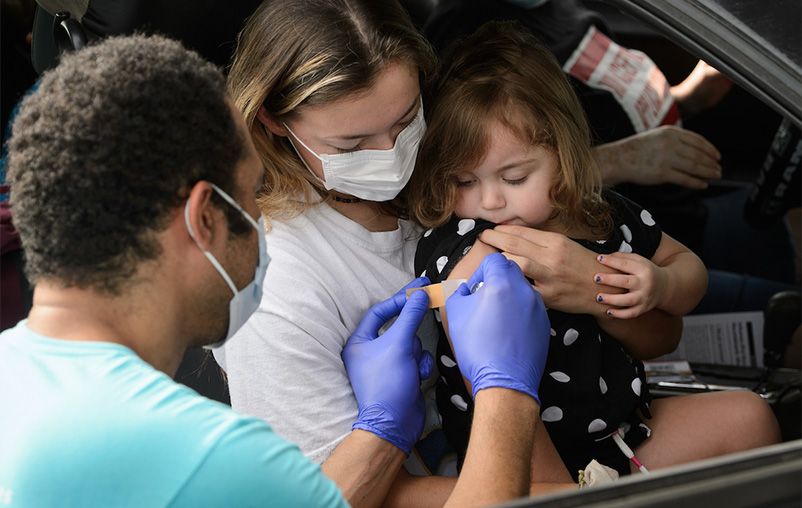For many patients, surviving COVID-19 is just the beginning of a long struggle to recover. If they’ve been hospitalized, their doctors may already know they face long-term damage to their heart muscle, scarred lung tissue or respiratory problems because they needed a ventilator. Doctors for these patients have likely referred them to specialists for ongoing care.
There are plenty of other post-COVID-19 patients, however, who have battled the virus at home. They’ve had little direct medical care and may not have had a positive COVID-19 test proving they were infected. They may, in fact, have difficulty convincing their physicians, employers or family members that their fatigue, memory problems and physical weakness are the result of a bout with the coronavirus.
“A lot of these patients are not coming forward,” says Dr. Monica Verduzco-Gutierrez. She and her staff diagnose ongoing problems and prescribe treatment for both groups of post-COVID patients who have come to be known as long-haulers. She says there’s evidence that many who had mild-to-moderate cases are not getting care that could help them recover.
“Some of them are being blown-off by doctors or the doctors don’t know what to do. They’re not getting a lot of guidance,” says Dr. Gutierrez.
Long-haulers look for help through social media
In the absence of a clear diagnosis and treatment, many of the long-haulers who toughed it out at home have turned to each other and social media for support.
In the COVID-19 Coronavirus Recovery and Support Group, a commenter posting under the name Olivia Powell shares symptoms she attributes to COVID-19, even though she says she hasn’t had a positive test.
“Since March my symptoms have been on and off,” she tells the Facebook group claiming almost 6,000 members. “Shortness of breath slightly here and there sometimes worse than other times; extreme fatigue & brain fog; migraines; some GI symptoms…not sure if these symptoms are from different things or all related or if I had COVID or didn’t,” she says.
Other commenters with the following posted identities describe other debilitating symptoms.
“Don’t have asthma but bet that’s what this feels like,” explains Cody Duncan from Orlando. She says she wasn’t hospitalized, but has been struggling to breathe for three months. “No talking for me as it quickly puts a ball in my chest and I suddenly can’t breathe.”
Betty Rogers from Branson, Missouri states, “I am 7 weeks post-positive. Still feel I have brain fog, taste and smell come and go and I am extremely tired after doing very little.”
Others describe blurred vision, the inability to sleep and twitching nerves that “go haywire.”
A need for official information and treatment
The search for relief through non-medical online sources concerns Dr. Gutierrez and health researcher Natalie Lambert from the Indiana University School of Medicine. They worry post-COVID patients may be trying unproven remedies because they don’t have access to medical professionals who can evaluate their conditions. In a recent report, Lambert says, “The mismatch between the health problems people are experiencing and the information that they can find from official health sources is noticeable and a potential cause for concern.”
In July, Lambert surveyed 1,567 long-haulers who are members of the Survivor Corps Facebook page. They described a range of post-COVID symptoms that far exceed a list provided by the U.S. Centers for Disease Control.
All of the respondents experienced fatigue. Others reported depression, night sweats, and hair loss. Many said they were anxious or depressed. Following are the top five reported symptoms:
| Reported Symptoms | 1567 Respondents |
| Fatigue | 1,567 |
| Body aches | 1,046 |
| Difficulty breathing | 1,020 |
| Lack of focus | 924 |
| Inability to exercise | 916 |
| Survey: Indiana University School of Medicine, July 2020 | |
Treatment offers hope
Most of the long-haulers who have come to Dr. Gutierrez’s clinic tested positive for COVID-19. Their symptoms, like those reported in Lambert’s survey, are “all over the map.”
Dr. Gutierrez has also evaluated patients who can’t prove they’ve had COVID-19. She still assesses and treats them.
“Whatever caused their problems, they still need rehabilitation,” she says.
While much about COVID-19 is still a mystery, Dr. Gutierrez says the conditions that seem to result from the virus aren’t new. She can usually refer patients to specialists or prescribe therapies aimed at restoring health. That may mean seeing a therapist to regain physical stability, think more clearly or fight anxiety and depression. Medication or medical procedures may be the answer for patients with lung and heart damage.
Dr. Gutierrez follows CDC guidelines stating patients with mild cases of COVID-19 are no longer contagious 10 days after symptoms first appeared. Those with severe cases are no longer contagious after 20 days. She recommends those still experiencing problems after that length of time seek medical help. Trying to recover on your own may mean many months of continued pain and incapacitation.
She says there’s hope and help. “The goal is to get back your quality of life.”
Patients are encouraged to see their primary care provider to manage and treat symptoms of long COVID.




